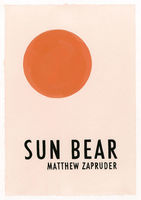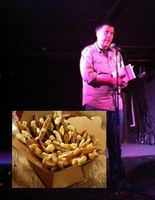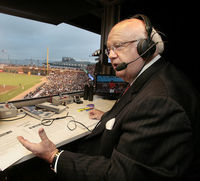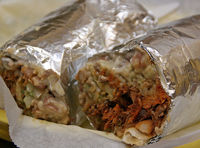Words & Curds: Matthew Zapruder, Author of Sun Bear
By Evan Munday
On April 22, I met with American poet Matthew Zapruder, the poet behind such books as the acclaimed The Pajamaist (Copper Canyon, 2006) and Come On All You Ghosts (Copper Canyon, 2010). In addition to his poetry, he was also the co-founder and is an editor at Wave Books, a publisher of beautiful books of poetry. Though originally from the Washington D.C. area, he now lives in Oakland, California. The collection Sun Bear was recently published by House of Anansi, and he visited to Toronto for their annual Poetry Bash. We visited Smoke's Poutinerie, and both ordered a 'Veggie Deluxe'(topped with mushrooms, sautéed onions and peas). We talked about the San Francisco Giants, reading poetry at the Twitter offices, and the many varieties of burrito. I finished my poutine. Zapruder failed to. This interview has been edited (somewhat) for length.
About Sun Bear: (adapted from the House of Anansi site) Matthew Zapruder's poems begin in the faint inkling, in the bloom of thought, and then unfold into wide-reaching meditations on what it means to live in the contemporary moment, among plastic, statistics, and diet soda.
EVAN: We were talking about places earlier. A lot of the poems in the book deal directly with Oakland. I'm thinking of 'Telegraph Flowers,' in particular, but you were saying sense of place really informs your work. What about Oakland do you think is in your writing?
MATTHEW: We just moved there about a year and a half ago, me and my wife. We were living in San Francisco. We were living in a little apartment in the North Beach area, which is a famous literary area where City Lights Books is … but San Francisco is very … has become very unaffordable, so if you want to buy a house, you have to – unless you work for Facebook – have to go to Oakland. So we moved out to Oakland, and my brother lives out there, too. I just think the effect of really putting down roots somewhere – like, buying a house and being somewhere – was really powerful for me, personally. I just think I identified with the place in a different way. And I started identifying with the city. In a way I haven't for a long time. I probably really only had that strong a feeling about New York. It caught me by surprise a little bit. As I was writing the book, Oakland became more and more this centre of gravity. But I also used to live in East Bay when I was a grad student at Berkeley, so I was familiar with the place. It was weird coming back to some place that had been such a big part of my life, and then it stopped being part of my life for so long, and then back again. Kind of like moving back to your hometown, in a weird way. So I was having this double vision, you could say. [Points upward to PA system playing Foreigner's 'Double Vision.']
EVAN: (Laughs.)
MATTHEW: But, it's been nice being there. And Oakland is a weird town. It's a very interesting, beautiful place with a lot of history. It's very mixed, racially, which is super-cool and feels good. I mean, San Francisco is an amazing city, it's just that right now, it's going through one of those periods of time when it's pretty impossible for a normal person to live there. I can see in Toronto sort of similar things happening, but the thing about Toronto is that it's so big that I don't think the same thing will happen. San Francisco, it's geographically so small that it's just the cost just gets out of control very fast. Places like Toronto or Oakland or Chicago … even L.A. … just the area that people can spread out takes the pressure off the housing crisis a little bit. I mean, obviously, I'm sure downtown is …
EVAN: Yeah, there are certain areas that are impossible … and it's slowly getting worse. A lot of the poems seem to be about loneliness, though not necessarily in a sad way. More, the idea of solitude and being alone. Especially as a writer. Has that changed at all since you've got married and started living together? Has that affected what you write about?
MATTHEW: That's a good question. A really good question. I think I feel like I spend a lot of time kind of sailing around alone in my skull. And so, that hasn't changed. The external circumstances in my life have become much more peaceful and better … so, in a way, that space is actually … easier to get into, in a way. And it's not like I don't share those intimate things with my wife. I do. It's just that … there's something about feeling alone when you don't have to be alone. That feels much warmer. To me, looking at the book again, I would say almost it's more neutral, that alone-space. A lot of times that alone-space in writing can be tinged with this kind of sadness or melancholy. Or you can despair. And that's understandable, but, for me, this alone-space is more neutral right now.
EVAN: To me, it seemed almost like it was almost a necessity for writing, in some ways.
MATTHEW: It is. It is. And I think that's true for all writers. They need to get in that space, y'know. But if over the time that of the writing of this book, my circumstances changed, that feeling of alone-ness did shift, in a way.
Your CanLit News
Subscribe to Open Book’s newsletter to get local book events, literary content, writing tips, and more in your inbox
EVAN: But almost having less external loneliness made it easier to access the internal loneliness?
MATTHEW: Yeah. Less external loneliness, and also just less external turmoil. And I don't necessarily – turmoil – I don't mean that in a pejorative way. It's just that … that was a time in life. And now there's a different time in life going on. So, that has changed everything about the structure and way of interacting with the world. When I read different poets, I see that shift, depending on where they are in their lives. I mean, I'm probably more overt about it because I write about my consciousness in a very direct way.
EVAN: I meant to ask you when we were talking about Oakland, you're still a fan of the Giants? Even though you're in Oakland now?
MATTHEW:Yeah, I mean I like the A's fine. But I have more American League allegiances because I grew up in Maryland and so I'm a Baltimore Orioles fan. I's hard for me to root for the A's. Just because they, in theory, they'd be competing against – so the Giants have been my National League team since the early 90s when I first lived in San Francisco. During the Barry Bonds years. I've kind of always followed them. And the ballpark is – have you ever been to the ballpark there? It's right in the middle of the city. And the Giants are such a fun team. So, they're a great team to root for.
EVAN: It's so nice to have stadiums in the city.
MATTHEW: It's the best. Is the SkyDome – is it the SkyDome where they still play?
EVAN: Yeah. It is. [I guess technically it's the 'Rogers Centre.']
MATTHEW: Isn't it downtown?
EVAN: Yeah, it's like, not even a ten-minute walk from here.
MATTHEW: I've been by there, but I've never been to see a Blue Jays game, which I would love to do. I like the Blue Jays. Next time I come up, I've gotta' see a game. It's funny because it's, like, my friends here are big hockey fans. I grew up rooting for the Washington Capitals. I used to go to hockey games. But I turn on ESPN last night when I got to the hotel, which I always do, and I wanted to see basketball highlights, because that's my favourite sport. Basketball. And it's like twenty-five minutes of hockey highlights! And it's the playoffs and everything. I get it. It's cool. But, I was thinking, 'Wow. They're really going through, covering every single thing.' Like, the depth of analysis!
EVAN: They're covering teams that aren't even in the playoffs.
MATTHEW: Right. (Laughs.) And it's very seductive. This hockey thing. It's – I always forget when I come here that hockey, by far, is the thing.
EVAN: It's funny, too, because there's a lot of interest in basketball right now because the Raptors are the only Toronto team that have made the playoffs in a long time.
MATTHEW: Well, yeah. And they're a very interesting team. They're a lot of fun to root for. Kyle Lowry and DeRozan, those guys are a lot of fun to watch. Yeah, I'm a pretty big sports fan, which I think takes some people by surprise. That, given what I write, that I would like sports. But … ever since I was a kid …
EVAN: Baseball, in particular, here. If you follow a lot of book people on Twitter in Toronto, half the feed is, like, about baseball.
MATTHEW: I know. I'm always complaining about balls and strike calls on there. Like, 'Are you the umpire? Unfollow.' I was going to say one thing that gave me unique pleasure was – I have a poem for the San Francisco Giants in the new book, and the San Francisco Chronicle reprinted it on home opening day and it mentions the announcer, Jon Miller, who I think is the best – one of the top announcers in baseball. But I used to listen to him when I was a kid, because he was the Baltimore Orioles announcer then. So, I mentioned him and has this secret hope that –
EVAN: – he would read it.
MATTHEW: Yeah and get in touch. But it didn't happen. (Laughs.) Wait, it's poetry. I forgot. Nobody cares. No, but that was pretty cool.
EVAN: Yeah, but you'd think that he might read the Chronicle. Another theme that runs through the book – oh, don't feel any obligation to finish it [the poutine] – is about the interconnectedness of all things. There's the one poem, 'How do you like the Underworld,' where you look at your computer and go back to how it got there, or even the poem, 'For Massachusetts,' where there's a line, 'I can't tell you how many people in the making of this experience that made this poem were harmed.'
MATTHEW: That's sort of a harsh line.
EVAN: It is, but there's this interest in looking at the hardship involved in making things that people take for granted, right? Is this something you think about often?
MATTHEW: Yeah. There's this word I've noticed popping up a lot over the past year or so: 'privilege.' We talk a lot about 'privilege.' And my reaction usually when a word like that gets repeated over and over is to start to feel this gradually building horror. But I think that, really for me, personally, that's what I'm – just the privilege of being socioeconomically, culturally where I am, is something I think about all the time. And, like, how do you reconcile that fact with what you know to be true about the world? Which is that a lot of people are suffering and a lot of your experiences rest on that suffering. There's nothing – you didn't choose it, but that's just the way it is. It's not like a brilliant insight I'm making here. A lot of people understand that, but that's something that I think about a lot when I'm walking around the beautiful lake where we live or when I'm using my iPhone. And I don't know what to do about it or what to think about it, so in the poems, that sort of hum of awareness of that, that little disturbance pops up into the poems and pops into the things
That poem, 'How do you like the Underworld.' I wrote that poem when I got invited to read at Twitter.
EVAN: Really? The Twitter offices?
MATTHEW: Yeah. And their headquarters are in this neighbourhood called 'The Tenderloin' in San Francisco, which would be, kind of, like … I don't know how to describe it – I don't want to disparage it – but it's a place where there are a lot of homeless people or people struggling with things, people living on the street. There's also a lot of great stuff there: great culture and life there, too. So it's odd that Twitter would be there. They're even renaming the area. They're rebranding it. They're calling it 'Mid-Market.' Market is this big street that goes right through the middle.
EVAN: Mid-Market has better associations in a tourist's mind?
MATTHEW: Yeah, 'Mid-Market' sounds better than 'The Tenderloin.' So, I got invited to read there, and I figured that I would write a poem for that situation. One of the things I did was watching my Twitter feed and, like, seeing all this weird stuff that people were writing. Especially near the end of that poem, it had become either just grabbing text or, like, torqued versions of what I read from the feed. But the poem is about looking in your amazing, incredible computer, that probably could have launched the space shuttle twenty years ago. And wondering how did this thing get here? What does it mean that I have the luxury to sit here and type away, dream a little bit … So, I feel a little dumb saying this, because it's not like it's some kind of brilliant philosophical insight that I'm making, but that doesn't mean it's not true.
EVAN: I think it's something that it was the poem you decided to read at Twitter. I mean, did you get any feedback after?
MATTHEW: I read there at lunchtime, and they had a couple poets in. The poet Victoria Chang, who wrote this book called The Boss, which came out from McSweeney's and is a really good book … and so, there were thirty people there who work at Twitter and they were really nice and we talked and went to lunch and it was fine. But it's their life. They work there. I don't want to be a dick. 'C'mon, assholes. Fight the power.' Because that would be so hypocritical of me. I use Twitter. So, what, I'm going to go there and tell them what capitalist assholes they are while I'm, like, benefitting from their work? The interesting this is, too, is this is in San Francisco. There's a lot of anger with the tech people now. Their wealth, their … there's a whole lot of conflict. And I was, in a kind of way, standing outside that and just … I didn't want to take sides, because I don't feel like I have a side. I don't feel that way. I guess that was part of what I was feeling, too. The feeling of going into that place. It was an interesting experience.
EVAN: Have you thought about the poutine? The manufacture that went into this?
MATTHEW: (Laughs.) I did not. I probably should. I like the fact that [the kitchen] is open. I always like a restaurant where you can see the cooks, because it feels … a little more human …
EVAN: I think it's all, like, PEI potatoes, too.
MATTHEW: I'm sure. I'm sure. Toronto! It's funny, I was walking through that park, y'know, that …
EVAN: The Grange?
MATTHEW: Yeah. And I saw a cop talking to these homeless people and – presumably homeless people … they were sleeping in the park – and the way he was talking to them was as if they were the most important people in the world. I absolutely wanted to weep. The respect and dignity? And there was no one else around. And I'm not saying … I'm sure some of the cops in San Francisco are nice, too, and there are instances of Toronto police acting badly. But it was different. There was this studied effort to make sure that everyone was being treated like human beings. And that's a beautiful park, too. I love seeing the backside of these buildings. You see that gorgeous blue building and then that crazy building with the stilts … and then that spiral and the old building …that's probably what I like best about Toronto. Is all these little old buildings that are kind of tucked in.
EVAN: Yeah, there's a lot of those, kind of, Victorian three-or-two-storey buildings. That box – that sort of floating box with sticks holding it up – is part of the Ontario College of Art.
MATTHEW: I was blown away. I love the way that looked. It looked so great. And that blue colour of that building is amazing. I was like, 'Wow! This is really great.'
EVAN: It's funny because you were talking about the thing you wrote for Twitter, and a lot of the poems are for specific things: places or people. There are a couple for engagement, for a Persian singer, for the state of Wisconsin, for wine, Japan … and it kind of reads almost like these are occasional poems. As if you got invited to speak at the Japanese embassy and wrote this poem. And I don't know if that's the case, but do you see yourself as an occasional poet? Writing for specific happenings or times?
MATTHEW: Yeah, well … that phrase, as I'm sure you know, has a slightly pejorative sense …
EVAN: Oh, I didn't mean –
MATTHEW: I know you didn't – but that's leading into my answer. I'm saying that I think there's a kind of reaction against the idea that one would write out of occasion or write out of specific events like that. That it's somehow not as lasting. I feel there's an incorrect idea that if something is about a specific event or specific thing that it's somehow limited. First of all, obviously that's not true if you look at the history of literature. I think a lot about Neruda's Odes, which are some of my favourite poems. But also Frank O'Hara … For me, it begins in that place, but I'm just beginning there. Physically, it feels like when a gear catches another gear. And I'm just spinning and I'm trying to look for something that catches. And you feel that catch and the poem starts. But there's some amount of spinning going on. The thing that makes it personal and something that makes that catch a lot of the times is a specific event or specific place or person, or time, or something. And it doesn't have to be a big thing. But then I'm looking to find out where it's going to go and where it's going to move and how it's going to get bigger or stranger and move away from that specific instance. I don't care so much about staying there. But it's a good way to get in. But I think about the ode as being the dominant template for that, in a way. But, like, Neruda's Odes to Common Things – hundreds and hundreds of odes to almost anything – those I found very inspiring.
EVAN: There's almost an element of surprise in a lot of these poems. You were saying you start one place and you don't really know where it's going and it takes you to these interesting places. Is that a specific choice in terms of using that structure? Or it more you yourself finding out where the poem is going as you write it?
MATTHEW: It's both, but more the latter. That's why I write poems: to have that feeling. Poems, more or less, I think what makes something a poem is that quality association. You can give somebody who writes short stories and somebody who writes poems and somebody who writes newspaper articles and somebody who writes children's books the same first sentence, and immediately, because of what they write, what happens next would be built differently. What it is they're doing in the piece has lots to do with who they are as people and what their imaginations are like. So, a poet will immediately start looking for a way to make a leap or a way to make a strange connection and that can take place in metaphor or that can take place in the actual structure of the sentence – its weirdness or whatever – and that can take place in the way ideas associate. I think that's just what poets, more or less, are looking for. And it can be a very aggressive sort of leaping or it can be a more subtle thing. I'm very interested in that and attracted to that feeling of that leap and that movement. That leap across the void that feels like it's both surprising and makes sense.
If it's too far a leap and it doesn't feel like it makes sense or is relevant to me, or feels arbitrary, then I won't … then I consider that I need to back up, back away. And if it's too predictable or close or exactly the way we always thing about things, then I'm a little less interested. And for me it's a physical feeling. I know it feels right in my self. In my body, basically. It's just as Frank O'Hara says, you've gotta' go on your nerve.
EVAN: There are a couple of good metaphors for writing in here, like when you talk about the 'eternal internship at the venerable multinational not for profit, Lucid & Dreaming' in 'Aubergine.' And there's another good line in one of the poems about 'placing a few nouns in beautiful cages, then letting them out.' If that, to you, is what writing is like, because you're an editor at Wave Books, what is editing like?
MATTHEW: I think that's a good question to ask right after what we were just talking about, because I feel like my role as an editor is very much to be a really good, attentive, sympathetic reader. And if I'm really not getting something the writer is doing, I feel like the writer needs to know that. That doesn't mean that they can't do it anyway, because ultimately it's their book. But I feel like my role is to ask questions about things that feel like they are unnecessarily distracting or counter-productive. When you're working on something, you can lose sight of why certain things are there, and there are a lot of things that are vestigial or extraneous. I've had this experience before, both as an editor and as a writer, where I didn't even remember something was in there. They'll ask why something is there, and I'll be like, 'Oh my God, I don't know. That was from twenty drafts ago!' And that can happen to the very best of writers. So I feel like my role is almost a sort of 'cleaner-upper,' for the most part. And a mirror. Or, like I said, to be this ideal – or very good – reader. I feel that's very much my job, to be in that person's service. I think one thing that's important, too, is, when you're an editor, there has to be trust there. The person needs to hear me talk about their work and talk back to them about it so they know that I know what's going on and what's important. Because if they don't feel that way, then why would they take my advice seriously? So, my first job is to be a really good reader. Really good.
EVAN: So you can understand what's happening.
MATTHEW: Even more than understand, really be deeply empathetic with … and can look at it from their point of view. While also, weirdly, looking at it from a reader's point of view, too. It's an interesting, difficult task. And there are people for whom I'm sure I'd be a terrible editor. Like, I just wouldn't be able to see their work somehow. You can't be a great editor for everyone. But I hope that the people I work with – I hope I'm good for them. And I hope I'm not really invasive or, like, blind to their virtues.
EVAN: (Laughs.)Wave also has some of the best-looking poetry books out there.
MATTHEW: Thank you. I would love to take credit for that, but I can't. It's the editor-in-chief, Joshua Beckman, and he works with a designer, Jeff Clark. I mean, I'm involved in the sense that I'm supportive … and talking through things with them, but Joshua's a visionary about it – and so's Jeff – about book design I'm much closer to an admirer than a generator of that. But, I agree. I think they look great. (Laughs.)
EVAN: In the poems of the book, you forget the names of so many things.
MATTHEW: Yep. (Laughs.)
EVAN: You forget the names of flowers or people's last names … things like that. And obviously, it's a conscious choice to point that out. You could easily look up the name of the purple flowers. What were you trying to do by including that temporary memory loss?
MATTHEW: I think that not knowing things is very generative for poetry. And so, I think, unfortunately, knowing too much can really kill a poem. I am always interested when I forget something or don't know it – both on a poetic but also a psychological level. I mean, Freud pointed out – and I think he's right – if you forget something over and over again, there's probably something going on there. But I also think, for a poet, it's particularly funny to forget the names of things. Because that's so … central to everything. It's like Emerson said, poets are the namers. Poets name things. That's what they do.
EVAN: They create words.
MATTHEW: So, I think it's funny to fail in that way, or fail to remember that. And then use that as a portal to more language. Like turning a deficiency into an advantage.
MATTHEW: And I hate faking it. It's like, if I didn't know, I didn't know. That's fine. I also have a real resistance to using the poem as a place to either prove how smart I am or how sensitive I am or …
EVAN: Like, you don't use the word 'interregnum' every day …
MATTHEW: (Laughs.) Right, and I'm not saying you have to be stupid or talk down to people, but when I read poems I don't like, very often it's because the poem's being used as a platform to either be cool or be funny or show people how smart you are … or how sensitive you are. And my job as a teacher a lot of the time – but no so much as an editor because the poets who I work with are past that, usually – but as a teacher, a lot of the time my role is to gently but clearly show the students how they're doing that in their poems. Often the biggest problem – and this is probably true of all writing – is we all have these deep anxieties about ourselves as writers and as people, and we use the writing to sometimes compensate for that. And that can be a generative thing … but it can also be a stylistic tic. Some of my students, for instance, will – if they're worried about being thought of as not smart – they will try to be really smart in their poems. They're worried about not being poetic enough, so they'll come up with really weird metaphors and really, like, broken lines and syntactical weirdness and these crazy images that really have nothing to do with the poem. So, you need to clear that stuff out. I try to go into whatever it seems like I'm afraid of looking like, I go towards that.
EVAN: That's just what I'll be.
MATTHEW: Yeah, because I don't want to fake it.
EVAN: So, do you think poutine would ever be a gear that could generate a poem?
MATTHEW: What, poutine? Yeah. Yeah, you know why? Because it's terrifying to me, poutine. The idea of poutine. Anything that scares me that much probably is a really good idea. Very tasty, poutine. When I was here about six or seven years ago, I was here with Joshua Beckman and Matt Rohrer for a reading and we did that thing where stayed up all night drinking and then we –
EVAN: Well, that's the ideal … this is probably best at 3 a.m.
MATTHEW: Right. And I think I'm still digesting that poutine. From, like, 2005. But I also just love the word, 'poutine.' It's great. It sounds great. That alone is enough to get me going. So, I'll give it a try.
EVAN: Is there anything … any kind of equivalent food that's native to Oakland or the Bay Area? Or even where you grew up, around Washington?
MATTHEW: Not where I grew up … well, there's good barbecue in D.C., but … late-night food, probably the thing that would be most likely to happen would be the burrito. Which I know you guys have here, of course.
EVAN: There are a lot of burrito places, but I think they're more prevalent in the States.
MATTHEW: The thing about San Francisco is there's a ton of places to get burritos and they're all quite different. You can sort of identify people by their favourite. You can ask someone, 'What's your favourite?' Or, 'Where do you eat?' And people are very passionate about their choice. For some people, it's almost like they want to prove their … whatever … their reputation .. that they're down …
EVAN: Like street cred.
MATTHEW: Street cred, right. Exactly. Or some people like this more bougie burrito – I mean, they're not really bougie, but, y'know, a little more –
EVAN: As much as a burrito can be.
MATTHEW: Right. So, there are these giant ones that are just like … if you eat one of these things, it's like eating poutine. So, I feel like the burrito is the natural answer for the Bay Area / San Francisco scene. I mean nothing is effective as poutine for the absorption of alcohol. But the burrito might be a close second. The only thing that makes sense about eating these foods is if you're burning, like, 8,000 calories a day. And you're legitimately in danger of – that would be an excuse for eating poutine, but I don't know if drinking 8,000 calories in beer and then the equivalent in poutine is … I'm a little old for that right now. But I've got to say, that feeling of actually literally sobering up as you eat the poutine … it might be psychological, but it is kind of remarkable. IOf course, we woke up the next morning feeling horrible. But for a moment, we thought it was working.
EVAN: I was interviewing a Danish author, Jonas Bengtsson. He had never had it before, and I asked him, 'What do you think?' He thought it need more starch. He said, 'I feel like there should be rice or pasta with this.'
MATTHEW: What?! I would go the opposite way. I would say that, for me, personally, I like the idea of a French fry-based kind of food, but I'm always going to want more of the other food. It doesn't take that many French fries for the effect. But for what this is designed for, the balance has been … has evolved perfectly. So I think suggesting it be different is a little inhuman, frankly. That's sort of suggesting that a mountain be different. It is what it is, man. Climb it or don't. Don't shake your finger at it.
Poutine Count:
Evan: 2
Authors: 0
The views expressed in the Writer-in-Residence blogs are those held by the authors and do not necessarily reflect the views of Open Book: Toronto.
The views expressed in the Writer-in-Residence blogs are those held by the authors and do not necessarily reflect the views of Open Book.
Evan Munday is the author and illustrator of the acclaimed book series for young readers, The Dead Kid Detective Agency. Both The Dead Kid Detective Agencyand its sequel, Dial M for Morna, were nominated for the Silver Birch Fiction Award.
Evan has worked in book marketing and publicity for ten years, eight of which were as publicist at Coach House Books, and he has since worked as a freelance illustrator and ebook designer.
Find out more about Evan on his website, idontlikemundays.com or follow him on Twitter at @idontlikemunday.










